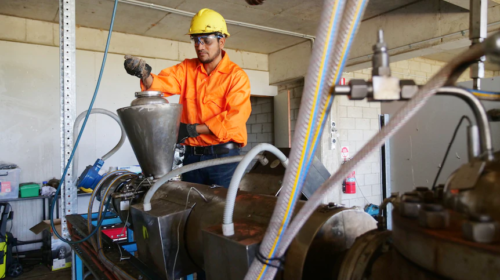Waste is piling up in Australian landfills at an exponential pace and “costing the economy and environment billions”, according to a CQUniversity researcher, but he believes he may have found a solution.
Postdoctoral research fellow Mohammed Jahirul Islam has completed pilot testing for a method that turns polystyrene, tyres, particle board, agriculture waste, other used plastics, and solid waste into commercial-grade petrol and diesel fuel. “We can use this very low-grade solid waste that cannot be used in any other types of recycling [and] convert it into a useful product,” Dr Islam said.
He said the practice would generate revenue and reduce Australia’s dependency on imported fossil fuels.”We are spending over $50 billion every year to process solid waste,” Dr Islam said.Professor Mohammed Rasul, the project supervisor, said it was the first of its kind to reach this scale in Australia.”Nobody has done all the mixed solid waste through pyrolysis, distillation and hydro treatment as far as I know,” he said. “We are 100 per cent confident that we will get the product to a quality that is required for Australian standard diesel.”
Professor Rasul said its price was incomparable to standard diesel, but would become more competitive as production scaled up.Ben Tabulo, the general manager of Renewable Southern Oil, said the project followed on from the “successful” work done with RMIT and CQU.”We definitely see it as being a commercially viable process,” he said.”[It] is generated from waste and so there are obviously incentives in place for waste processing — a lot of the uplift comes from that end of it.”The fuel itself actually has no green premium associated with it.”If you’re paying $1.30 for diesel from fossil, you would be paying $1.30 for diesel from renewable sources.”
He said biogas would be essential, despite net-zero targets and a predicted rise in electric vehicle use.”Biofuels will play a significant role during this transition period,” he said.”You have to develop a lot of infrastructure for electric vehicles [but] with biofuels, it’s easy to fit into the existing infrastructure like gas stations because it’s just a liquid fuel.” Dr Kaparaju said biofuels were “the immediate solution” to reducing the impact of greenhouse gases from the transport sector. While passenger vehicles were already transitioning to electric, he said the aviation and cargo sectors would be much slower — keeping demand for biofuels high.
Dr Islam was awarded an Advance Queensland Industry Research Fellowship of $360,000 from the state government in November. With $1.8 million from the Cooperative Research Centre Projects, $500,000 from CQU, and further funding from partners Northern Oil and RMIT University, the team will enter the next phase.”In the pilot testing we found that the quality of the fuel is close to commercial or conventional diesel or petrol fuel,” Dr Islam said.”But still we don’t have any industry that will produce the amount of diesel and petrol from solid waste that has a low price and can also meet our national demand.”





